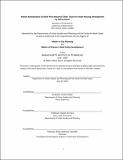| dc.contributor.advisor | Lorlene Hoyt. | en_US |
| dc.contributor.author | Beam, Jeffrey (Jeffrey J.) | en_US |
| dc.contributor.other | Massachusetts Institute of Technology. Center for Real Estate. | en_US |
| dc.date.accessioned | 2010-09-22T16:04:58Z | |
| dc.date.available | 2010-09-22T16:04:58Z | |
| dc.date.copyright | 2009 | en_US |
| dc.date.issued | 2009 | en_US |
| dc.identifier.uri | http://hdl.handle.net/1721.1/58661 | |
| dc.description | Thesis (M.C.P.)--Massachusetts Institute of Technology, Dept. of Urban Studies and Planning; and, (S.M. in Real Estate Development)--Massachusetts Institute of Technology, Dept. of Urban Studies and Planning, Center for Real Estate, 2009. | en_US |
| dc.description | This electronic version was submitted by the student author. The certified thesis is available in the Institute Archives and Special Collections. | en_US |
| dc.description | Cataloged from student submitted PDF version of thesis. | en_US |
| dc.description | Includes bibliographical references (p. 81-83). | en_US |
| dc.description.abstract | For generations, housing programs have sought to utilize redevelopment projects to accomplish broader community revitalization goals. Contemporary affordable housing practice embodies this idea in large housing development projects, often funded through government programs such as HOPE VI. This "Conventional" revitalization is primarily based on experiences within the distressed housing projects of large cites, on the false premise that the impacts of redevelopment will be the same in a small post-industrial city as in a large, economically diverse one. Housing developers entering the context of a small post-industrial city must reconsider this idea. They must understand an idea of "holistic" housing revitalization that leverages the development process to make positive economic, physical, and psychological impacts that specifically address the specific challenges in these cities, such low civic capacity, poverty, low governing capacity, large immigrant populations, and an abundance of vacant properties. Fortunately these places possess inherent assets, such as walkable scale, historic architecture and cultural institutions, that present unique opportunities which position them to lead a national economic recovery through sustainable building projects. This report focuses on three cases of current, innovative housing development: * An industrial mill conversion that creates a new mixed use neighborhood in Lawrence, Massachusetts; * An adaptive reuse of a prominent hotel in Flint, Michigan that has sat vacant for 30 years into new downtown student housing; and * A new apartment community for single-parent, full-time students in Owensboro, Kentucky. | en_US |
| dc.description.abstract | (cont.) Against the background of the broader evolution of holistic housing development, the cases directly address the unique challenges of small cities. Comparing the cases and their formative partnerships, concepts and strategies yields a wide range of data to support an idea of Holistic revitalization in these places. The primary data include over twenty hours of interviews with project proponents and stakeholders, as well as development proposals, zoning opinions, financing applications, consultant reports and local press coverage. Together, they provide a detailed view of Holistic revitalization and the tools of its implementation in small post-industrial cities. | en_US |
| dc.description.statementofresponsibility | by Jeffrey Beam. | en_US |
| dc.format.extent | 83 p. | en_US |
| dc.language.iso | eng | en_US |
| dc.publisher | Massachusetts Institute of Technology | en_US |
| dc.rights | M.I.T. theses are protected by
copyright. They may be viewed from this source for any purpose, but
reproduction or distribution in any format is prohibited without written
permission. See provided URL for inquiries about permission. | en_US |
| dc.rights.uri | http://dspace.mit.edu/handle/1721.1/7582 | en_US |
| dc.subject | Urban Studies and Planning. | en_US |
| dc.subject | Center for Real Estate. | en_US |
| dc.title | Holistic revitalization in small post-industrial cities : tools for urban housing development | en_US |
| dc.type | Thesis | en_US |
| dc.description.degree | S.M.in Real Estate Development | en_US |
| dc.description.degree | M.C.P. | en_US |
| dc.contributor.department | Massachusetts Institute of Technology. Center for Real Estate | en_US |
| dc.contributor.department | Massachusetts Institute of Technology. Department of Urban Studies and Planning | |
| dc.identifier.oclc | 613216446 | en_US |
